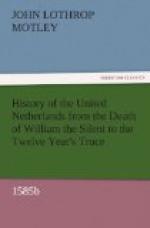He was a soldier, courageous, untiring, prompt in action, useful in council, and had distinguished himself in many a hard-fought field. Taken prisoner in the sanguinary skirmish at Maaslandssluys, he had been confined a year, and, for more than three months, had never laid his head, as he declared, upon the pillow without commending his soul as for the last time to his Maker, expecting daily the order for his immediate execution, and escaping his doom only because William the Silent proclaimed that the proudest head among the Spanish prisoners should fall to avenge his death; so that he was ultimately exchanged against the veteran Mondragon.
From the incipient stages of the revolt he had been foremost among the patriots. He was supposed to be the author of the famous “Compromise of the Nobles,” that earliest and most conspicuous of the state-papers of the republic, and of many other important political documents; and he had contributed to general literature many works of European celebrity, of which the ‘Roman Bee-Hive’ was the most universally known.
Scholar, theologian, diplomatist, swordsman, orator, poet, pamphleteer, he had genius for all things, and was eminent in all. He was even famous for his dancing, and had composed an intelligent and philosophical treatise upon the value of that amusement, as an agent of civilisation, and as a counteractor of the grosser pleasures of the table to which Upper and Nether Germans were too much addicted.
Of ancient Savoyard extraction, and something of a southern nature, he had been born in Brussels, and was national to the heart’s core.
A man of interesting, sympathetic presence; of a physiognomy where many of the attaching and attractive qualities of his nature revealed themselves; with crisp curling hair, surmounting a tall, expansive forehead—full of benevolence, idealism, and quick perceptions; broad, brown, melancholy eyes, overflowing with tenderness; a lean and haggard cheek, a rugged Flemish nose; a thin flexible mouth; a slender moustache, and a peaked and meagre beard; so appeared Sainte Aldegonde in the forty-seventh year of his age, when he came to command in Antwerp.
Yet after all—many-sided, accomplished, courageous, energetic, as he was—it may be doubted whether he was the man for the hour or the post. He was too impressionable; he had too much of the temperament of genius. Without being fickle, he had, besides his versatility of intellect, a character which had much facility in turning; not, indeed, in the breeze of self-interest, but because he seemed placed in so high and clear an atmosphere of thought that he was often acted upon and swayed by subtle and invisible influences. At any rate his conduct was sometimes inexplicable. He had been strangely fascinated by the ignoble Duke of Anjou, and, in the sequel, it will be found that he was destined to experience other magnetic or magical impulses, which were once thought suspicious, and have remained mysterious even to the present day.




